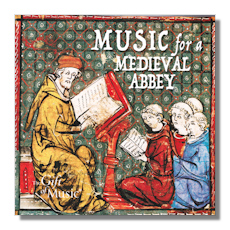
The Internet's Premier Classical Music Source
Related Links
-
Hildegard Reviews
- Latest Reviews
- More Reviews
-
By Composer
-
Collections
DVD & Blu-ray
Books
Concert Reviews
Articles/Interviews
Software
Audio
Search Amazon
Recommended Links
Site News
 CD Review
CD Review
Hildegard von Bingen

Music for a Medieval Abbey
- O vos angeli
- Studium divinitatis
- O successores
- Kyrie
- O quam mirabilis
- O viridissima
- O orzchis ecclesia
- Columba aspexit
- O nobilissima viriditas
- O pater omnium
- Vos flores rosarum
- Laus Trinitate
- O Euchari
- Ordo virtutum
- Procession: In principio omnes
The Oxford Girls Choir/Richard Vendorne
The Gift of Music CCLCDG1289
If you're "converted" to the angelic and ethereal world of the actually very real and amazingly varied gifts and skills of St. Hildegard of Bingen, who lived a deservedly long life, from 1098 to 1179 – over 80 years – you will probably not mind that recordings of her ecstatic yet communicative music continue to be released apace.
Here is a collection of 15 mostly familiar pieces, none of which is unavailable elsewhere. It's sung with dedication by the Oxford Girls Choir and unnamed male vocalists with unidentified instrumentalists on some tracks, and directed by Richard Vendome.
Unfortunately, the aim of the CD seems to have been to suggest how evocative and inducing of a mood of tranquility music in a mediaeval abbey was, rather than to convey the exact nature of Hildegard's creativity through mature musicianship. While the singing is for the most part energetic and clean, there are passages (at two minutes or so into the very first work, the celebrated O vos angeli [tr.1], for instance) where the high notes are too much for presumably inexperienced voices; the sound comes close to breaking and its shrillness certainly pulls up short the listener who may be seeking calm.
The selection of Hildegard's works is a good one: there is the very familiar and oft-recorded as well as some more rarely heard works. There is variation in pace as well… Studium divinitatis [tr.2] and Laus Trinitate [tr.12] last barely a minute each while Ordo virtutum [tr.14] is over ten. What's more – for all this music's ready availability on disk – the girls in this choir sing with a freshness and evident attachment to the music, and even to some of the many wider acts of creativity and devotion which Hildegard has come to represent.
It's all the more disappointing that their roughness and inability to caress and respect the music consistently seems to take second place to their enthusiasm. It's true that Hildegard's work can be performed far too languorously; it could be argued that here the approach is an opposite: too "businesslike". It focuses less on uplift and subtlety than realism. It could well be that such was the way in which it was performed almost a thousand years ago. But one feels that there is just a touch too much haste and perfunctoriness where perhaps something of a gentle sidelong glance would have served better. These are not bad performances (some of those high notes notwithstanding); but a little undistinguished.
The acoustic, the chapel of All Saints Convent in Oxford, is slightly resonating and would be just what was needed to elicit both passion and precision from this music. The two page sheet that comes with the CD is decidedly minimal with a brief background possibly intended for those completely new to the world of mediaeval monasticism; and a track listing. Not the CD to put at the top of your list if encountering Hildegard for the first time. But one that has its merits.
Copyright © 2016, Mark Sealey


















